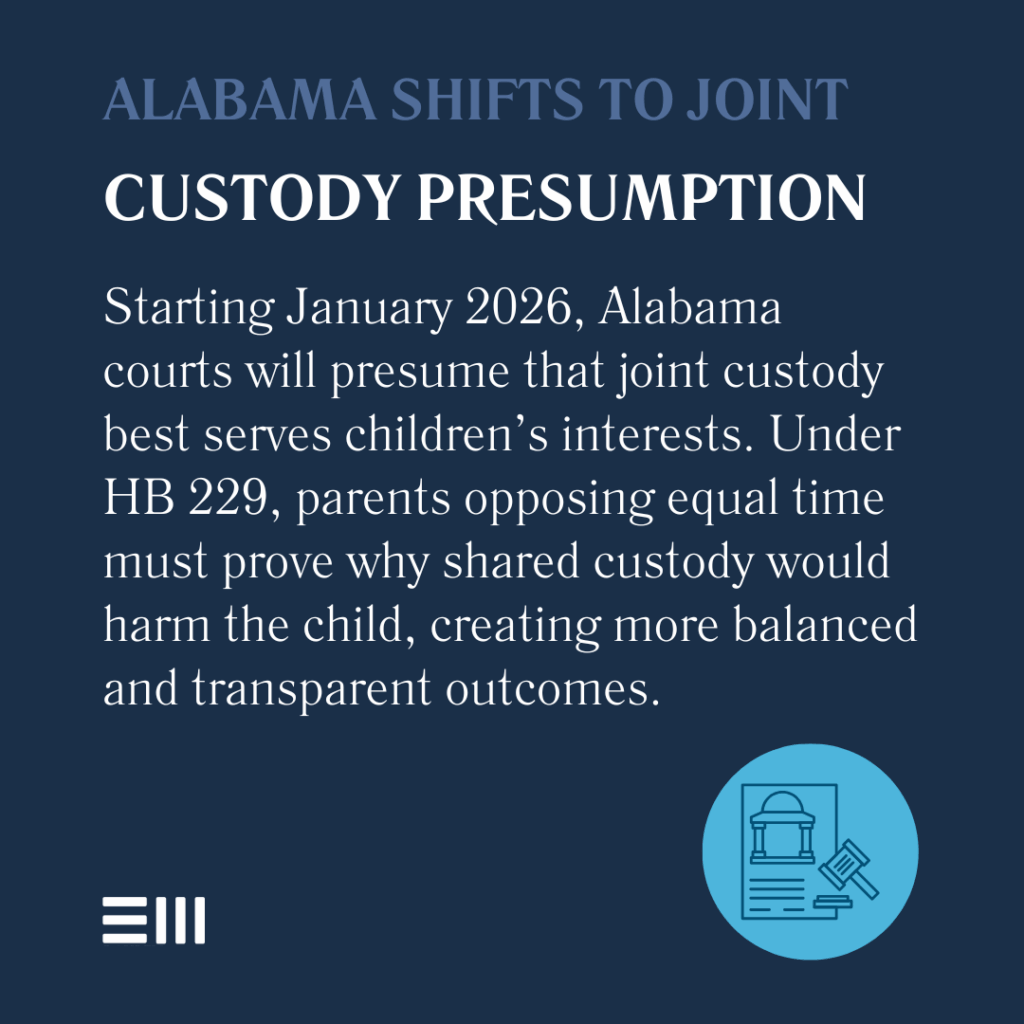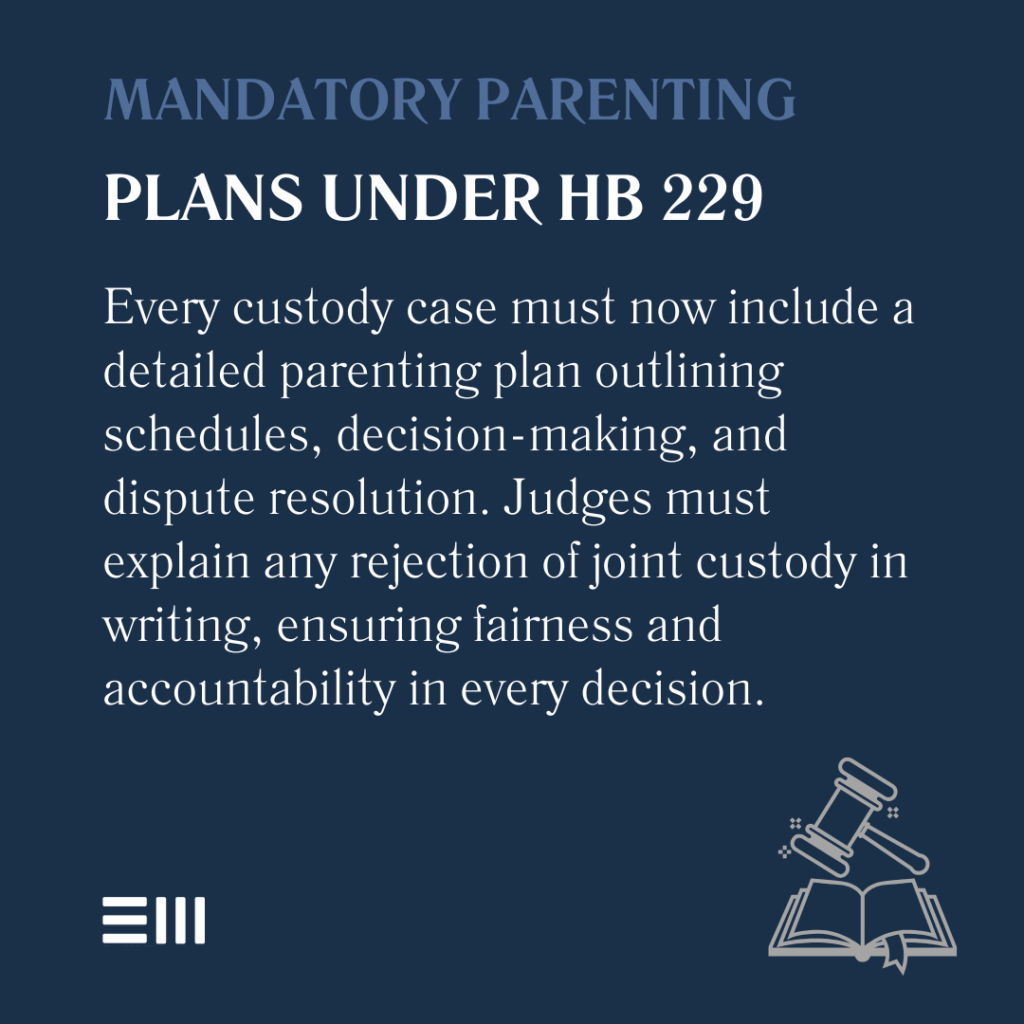
Beginning January 1, 2026, Alabama families navigating custody disputes will encounter a dramatically transformed legal landscape.
House Bill 229, known as the Best Interest of the Child Protection Act, represents the most significant overhaul of Alabama’s child custody laws in nearly two decades, establishing a presumption that joint custody best serves children’s interests unless proven otherwise.
Understanding the Shift to Joint Custody Presumption
For decades, Alabama judges enjoyed broad discretion in custody decisions, leading to inconsistent outcomes across counties and courtrooms.
HB 229 fundamentally changes this approach by creating a rebuttable presumption favoring joint legal and physical custody—meaning courts must start with the assumption that sharing custody equally benefits children.
This shift places Alabama among a growing number of states recognizing that children typically thrive when maintaining meaningful relationships with both parents.
The law defines “frequent and substantial contact” as equal or approximately equal time with each parent, removing longstanding ambiguity that plagued previous custody determinations.
Key changes under HB 229 include:
- Burden Shift: Parents opposing joint custody must now prove why equal sharing would harm the child, rather than advocates having to justify shared parenting.
- Mandatory Parenting Plans: Every custody case must include detailed parenting plans, even when joint custody isn’t sought.
- Written Findings Required: Judges rejecting joint custody must document specific reasons and factual basis for their decisions.
- Expedited Relief Process: Parents can file verified motions for temporary relief with penalties for bad-faith filings.
These provisions aim to create consistency, transparency, and accountability in Alabama’s child custody determinations.

Impact on Divorce and Custody Proceedings
The new law transforms how Alabama divorce attorneys approach custody cases. Strategic considerations now begin with accepting or challenging the joint custody presumption, requiring more robust evidence gathering from day one.
For divorcing parents, HB 229 means:
- Enhanced Documentation: Courts require comprehensive parenting plans detailing schedules, decision-making authority, holiday arrangements, transportation, and dispute resolution procedures.
- Greater Scrutiny: Deviations from joint custody face heightened judicial review with mandatory written explanations.
- Enforcement Mechanisms: New remedies address time-sharing violations, including makeup time, cost reimbursement, and attorney fees.
- Modification Standards: Future custody changes must demonstrate material circumstances changes while considering the new statutory framework.
These changes emphasize cooperation and detailed planning over adversarial litigation.
Preparing for the New Legal Landscape
Parents and attorneys must adapt strategies for the HB 229 era. Preparation becomes crucial, as unsupported allegations or speculative motions may result in sanctions or fee obligations.
Essential preparation steps include:
- Evidence Collection: Document parenting involvement, communication patterns, and co-parenting history to support or challenge the presumption.
- Parenting Plan Development: Create detailed, practical plans anticipating future needs, including education, healthcare, and extracurricular activities.
- Expert Consultations: Expect increased demand for psychological evaluations and parenting assessments in contested cases.
- Communication Records: Maintain thorough documentation of all parent interactions and compliance with existing arrangements.
Proactive preparation helps parents navigate the new requirements effectively.

What This Means for Alabama Families
HB 229 reflects evolving understanding about children’s developmental needs and the importance of maintaining relationships with both parents.
The law addresses concerning statistics—children with limited contact to one biological parent account for disproportionate rates of academic struggles, behavioral issues, and teenage pregnancies.
For families, the new framework offers:
- Increased Predictability: Clear statutory presumptions reduce uncertainty in custody outcomes.
- Enhanced Parental Rights: Both parents start with equal footing in custody determinations.
- Child-Focused Outcomes: Emphasis on maintaining dual parental relationships aligns with research on children’s wellbeing.
- Reduced Litigation: Clear standards may encourage negotiated settlements over costly court battles.
However, the law also demands greater parental responsibility and cooperation.
Exceptions and Special Circumstances
While HB 229 establishes joint custody as the starting point, it recognizes that equal sharing isn’t always appropriate. The law maintains protections for situations involving:
- Domestic Violence: Courts retain authority to protect children from abusive environments.
- Substance Abuse: Active addiction issues can override the joint custody presumption.
- Geographic Barriers: Significant distance between parents may make equal time-sharing impractical.
- Parental Unfitness: Evidence of inability to provide safe, stable environments justifies sole custody arrangements.
Courts evaluate these factors through the lens of children’s safety and wellbeing.
Moving Forward Under New Guidelines
As January 1, 2026 approaches, Alabama families must understand how HB 229 affects their custody situations. Existing orders remain valid, but future modifications fall under the new framework.
The law specifically states that HB 229’s passage alone doesn’t constitute grounds for modification.
Important considerations for families include:
- Review Existing Orders: Understand how current arrangements align with new standards.
- Strengthen Co-Parenting: Develop communication strategies supporting joint custody success.
- Document Compliance: Maintain records demonstrating adherence to custody schedules.
- Seek Legal Guidance: Consult with experienced family law attorneys familiar with HB 229 requirements.
Early preparation positions families for success under the new law.
Navigating Your Custody Case Under HB 229
Alabama’s House Bill 229 represents a paradigm shift in how courts approach child custody, prioritizing shared parenting while maintaining flexibility for unique family circumstances.
Whether you’re facing an initial custody determination or considering modifications, understanding these changes proves essential for protecting your parental rights and your children’s best interests.
Our experienced family law attorneys at Baxley Maniscalco are closely monitoring the implementation of HB 229 and preparing strategies to help clients navigate this new landscape.
We understand that every family’s situation is unique, and we’re committed to developing custody solutions that work within the new framework while addressing your specific needs.
Feel free to get in touch at (256) 770-7232 to discuss how HB 229 affects your custody case.
Can't find what you're looking for? Search our site below.










